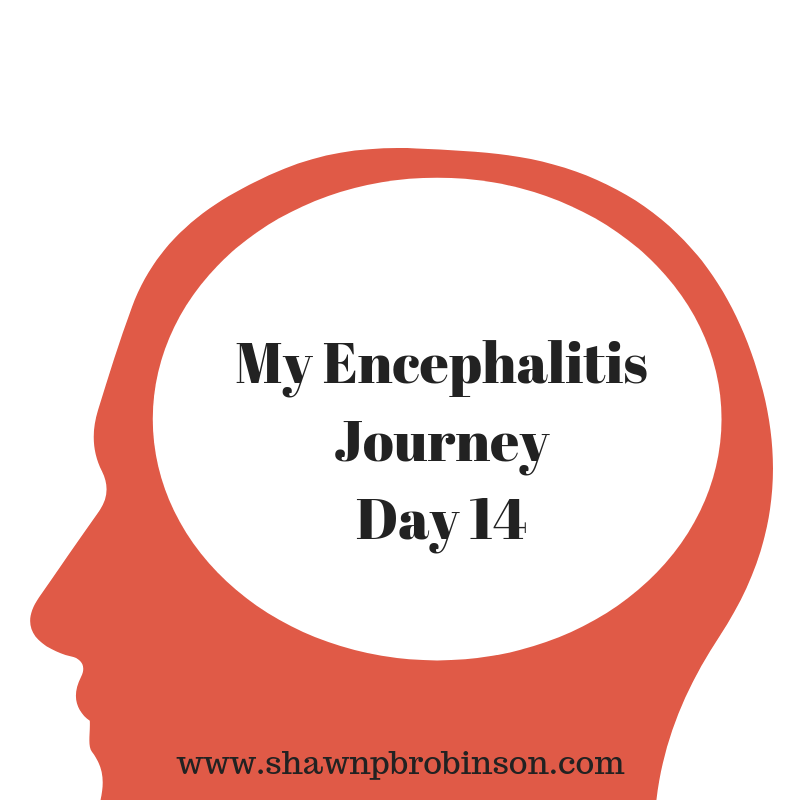
This post is a continuation of a series looking back to my experience in 2017 with Encephalitis. For the previous post, click here.
Thursday, February 9, 2017
Today I woke up with my normal pain, but no fear of belly needles. It was shaping up to be a good day.
I had nurses scheduled to come to my home each day, once I was home from the hospital. Their job was to make sure the tubes going into my body were clean and clear, to hook up new bags of antivirals and to tell me that I was not allowed to shower because it would get the PICC line wet (we found a way around that one).
The regular nurses who came to the house were so nice, friendly and helpful. We still really didn’t know what was going on with me (no one really did), but they helped as much as they could. It was relatively easy for them to say, “You have encephalitis, and this is what we need to do to get rid of it,” but no one really knows how the future will look once your treatment is underway.
Things had, however, changed. My brain wasn’t quite the same as it was before.
My first real look into how things had changed happened Thursday morning. I had not realized how much the isolation room in the hospital with its lack of noise, interaction and mental stimulation was a blessing to me in my recovery.
My wife and I had just finished having breakfast together. We were chatting, and she asked me to send a text to someone. I started into the text, and while I was texting, she said something or other to me… nothing major, she just casually mentioned something small. The combination of trying to send a text and listening to someone talk sent me to the other room for an hour long nap. It is strange to realize you need a nap because someone spoke to you while you were texting.
I can also remember trying to pour myself a cup of coffee at some point after returning home. That sounds unimportant, but it stands out in my mind because it taught me that I was in a far worse condition than I had thought.
It’s a simple thing to do, of course, to pour a cup of coffee. Unfortunately, someone tried speaking to me at the same time, and suddenly coffee was pouring all over the place. Multitasking had become my enemy.
I did not notice the change in the hospital because while there, I never had two things happen at once. They never tried feeding me breakfast while giving me a belly needle. They never tried asking about family medical history while giving me a belly needle. They never tried giving me an MRI while giving me a belly needle. They never tried giving me a belly needle while not giving me a belly needle.
Hmm… the belly needle topic keeps coming up. I might be bitter. I will have to examine my heart and move toward forgiveness.
I know what some of you are thinking when I speak about multitasking… because I’ve heard it before (even from a doctor). You’re dying to chuckle and say, “Ahh… maybe not being able to multitask is a good thing!” Yes, it does sound wise to do one thing at a time… but that’s not the issue.
Imagine, for a moment, that you want to tell someone something important. Now imagine that you have to find a chair before you tell them the important matter because you cannot think on a deep level, speak and maintain a standing position all at the same time. Multitasking is not a bad thing. 🙂
I believe tomorrow will be my last post in this series. I hope to share a little bit about the process going forward to bring you up to speed on where things are at now.
To be continued…
To read the final part of this journey, click here.

7 responses to “Day Fourteen of My Encephalitis Journey”
[…] To follow the next part of this journey, click here. […]
That barrier against simple multitasking is truly weird.
I’ve never been a normal kind of guy. 🙂
I’m glad I’m much better in that regard now, although still limited.
I don’t think it’s a weird thing for people who’ve suffered swelling in the brain – I’ve seen people who’ve had physical accidents and had to re-learn how to do more than one thing (including remembering while standing!). No one explained it, but it seemed that the brain would need to work on how to fix itself first, even at the cost of other body functions. The machine doesn’t work without the coding, so if the coding is kept as simple as possible, the errors can be worked around/through/revised.
Perhaps.
The brain is a funny thing. We tend not to realize how much work it does until it can’t do what we need. 🙂
And what it does is try very hard to keep us alive! Even to the point of ensuring some moments of memory are ‘archived’ because of the harm they may do.
People who suffer extreme agony find the brain has shut off that moment, and won’t let it come back, even if the person was conscious (burn victims have experienced this). It is an amazing piece of engineering and more.
[…] This post is a continuation of a series looking back to my experience in 2017 with Encephalitis. For the previous post, click here. […]